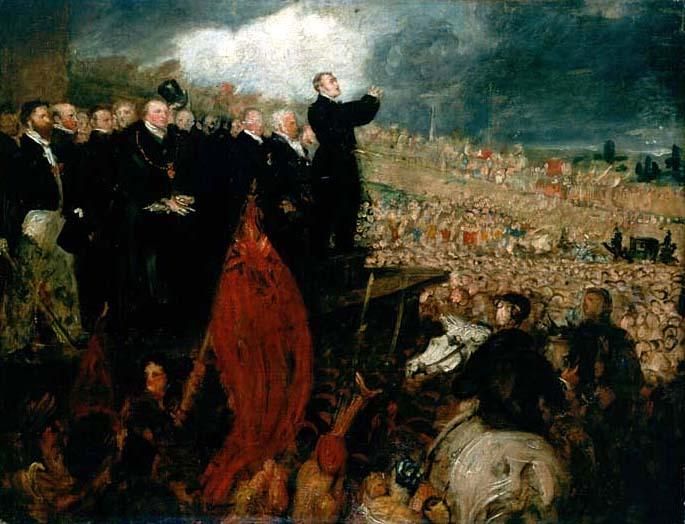|
Thomas Frost (writer)
Thomas Frost (16 December 1821 – 16 July 1908) was an English radical writer, journalist, lecturer, printer and Chartist.Peter Gurney, Frost, Thomas (1821–1908), ''Oxford Dictionary of National Biography'', online edn, Oxford University Press, Oct 2007. Retrieved 18 April 2010. Biography Early years Thomas Frost was born in Croydon in Surrey (now part of Greater London) on 16 December 1821, the son of a tailor who had read William Cobbett's '' Political Register'' and took part in the agitation to secure the Reform Act 1832. Apprenticed to a printer (his cousin Cornelius Chapman) in Norwood, London, Thomas started his own printing firm in the same town after Chapman's business became bankrupt.Frost, Thomas. ''Reminiscences of a Country Journalist''. Covent Garden: Ward and Downey, 1888 Career In 1846 he took over the publication of John Goodwyn Barmby's ''Communist Chronicle,'' a monthly paper which had been discontinued for financial reasons. Frost revived the Chronic ... [...More Info...] [...Related Items...] OR: [Wikipedia] [Google] [Baidu] |
Chartism
Chartism was a working-class movement for political reform in the United Kingdom that erupted from 1838 to 1857 and was strongest in 1839, 1842 and 1848. It took its name from the People's Charter of 1838 and was a national protest movement, with particular strongholds of support in Northern England, the East Midlands, the Staffordshire Potteries, the Black Country, and the South Wales Valleys. The movement was fiercely opposed by government authorities who finally suppressed it. Support for the movement was at its highest when petitions signed by millions of working people were presented to the House of Commons. The strategy employed was to use the scale of support which these petitions and the accompanying mass meetings demonstrated to put pressure on politicians to concede manhood suffrage. Chartism thus relied on constitutional methods to secure its aims, though some became involved in insurrectionary activities, notably in South Wales and in Yorkshire. The People's Ch ... [...More Info...] [...Related Items...] OR: [Wikipedia] [Google] [Baidu] |
Magic (illusion)
Magic, which encompasses the subgenres of illusion, stage magic, and close up magic, among others, is a performing art in which audiences are entertained by tricks, effects, or illusions of seemingly impossible feats, using natural means. It is to be distinguished from paranormal magic which are effects claimed to be created through supernatural means. It is one of the oldest performing arts in the world. Modern entertainment magic, as pioneered by 19th-century magician Jean-Eugène Robert-Houdin, has become a popular theatrical art form. In the late 19th and early 20th centuries, magicians such as Maskelyne and Devant, Howard Thurston, Harry Kellar, and Harry Houdini achieved widespread commercial success during what has become known as "the Golden Age of Magic." During this period, performance magic became a staple of Broadway theatre, vaudeville, and music halls. Magic retained its popularity in the television age, with magicians such as Paul Daniels, David ... [...More Info...] [...Related Items...] OR: [Wikipedia] [Google] [Baidu] |
English Male Journalists
English usually refers to: * English language * English people English may also refer to: Peoples, culture, and language * ''English'', an adjective for something of, from, or related to England ** English national identity, an identity and common culture ** English language in England, a variant of the English language spoken in England * English languages (other) * English studies, the study of English language and literature * ''English'', an Amish term for non-Amish, regardless of ethnicity Individuals * English (surname), a list of notable people with the surname ''English'' * People with the given name ** English McConnell (1882–1928), Irish footballer ** English Fisher (1928–2011), American boxing coach ** English Gardner (b. 1992), American track and field sprinter Places United States * English, Indiana, a town * English, Kentucky, an unincorporated community * English, Brazoria County, Texas, an unincorporated community ... [...More Info...] [...Related Items...] OR: [Wikipedia] [Google] [Baidu] |
Chartists
Chartism was a working-class movement for political reform in the United Kingdom that erupted from 1838 to 1857 and was strongest in 1839, 1842 and 1848. It took its name from the People's Charter of 1838 and was a national protest movement, with particular strongholds of support in Northern England, the East Midlands, the Staffordshire Potteries, the Black Country, and the South Wales Valleys. The movement was fiercely opposed by government authorities who finally suppressed it. Support for the movement was at its highest when petitions signed by millions of working people were presented to the House of Commons. The strategy employed was to use the scale of support which these petitions and the accompanying mass meetings demonstrated to put pressure on politicians to concede manhood suffrage. Chartism thus relied on constitutional methods to secure its aims, though some became involved in insurrectionary activities, notably in South Wales and in Yorkshire. The People's Ch ... [...More Info...] [...Related Items...] OR: [Wikipedia] [Google] [Baidu] |
19th-century English Memoirists
The 19th (nineteenth) century began on 1 January 1801 ( MDCCCI), and ended on 31 December 1900 ( MCM). The 19th century was the ninth century of the 2nd millennium. The 19th century was characterized by vast social upheaval. Slavery was abolished in much of Europe and the Americas. The First Industrial Revolution, though it began in the late 18th century, expanding beyond its British homeland for the first time during this century, particularly remaking the economies and societies of the Low Countries, the Rhineland, Northern Italy, and the Northeastern United States. A few decades later, the Second Industrial Revolution led to ever more massive urbanization and much higher levels of productivity, profit, and prosperity, a pattern that continued into the 20th century. The Islamic gunpowder empires fell into decline and European imperialism brought much of South Asia, Southeast Asia, and almost all of Africa under colonial rule. It was also marked by the collapse of the la ... [...More Info...] [...Related Items...] OR: [Wikipedia] [Google] [Baidu] |



